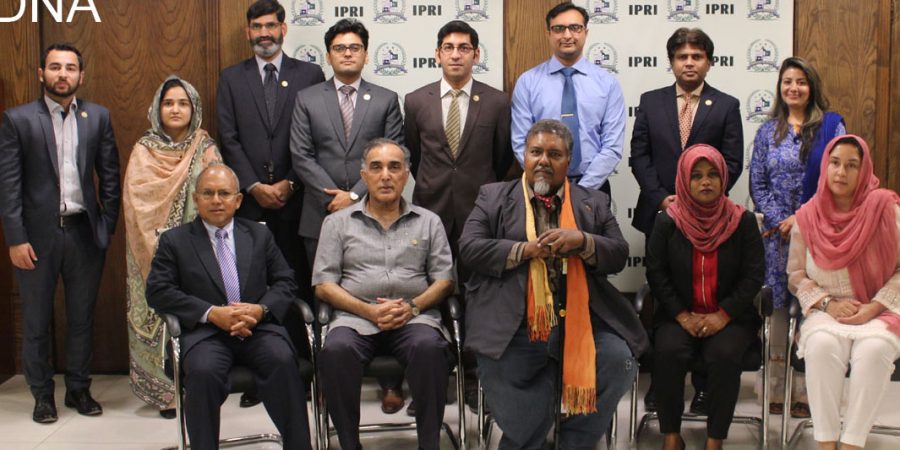Media delegation from Maldives visits IPRI

ISLAMABAD, JUNE 18 (DNA) – The Islamabad Policy Research Institute hosted a reception for 3-member media delegation from Maldives, on Tuesday.
The delegation included Mr Waheed Ibrahim, Mr Farooq Mohamed Hassan and Ms Zihnath Hassan.
The visit of the delegation to Pakistan has been organized by the Pakistan Tourism Development Corporation (PTDC).
Brig. (R) Mehboob Qadir, Director Research at IPRI led the briefing and welcomed the delegation to IPRI.
At the outset, an overview was given of the Institute and the delegation was informed about the genesis of IPRI, its main goals, the focus of its research and other activities. This was followed by a presentation on ‘Pakistan’s Efforts in Combating Terrorism’ by IPRI’s Research Fellow Mr Khalid Hussain Chandio.
He provided a brief historical context and said that following 9/11, Pakistan joined hands with the international community in the fight against terrorism, and became a front line state and major non-NATO ally.
Mr Chandio pointed out that ‘In spite of limited resources, Pakistan continues to play an active role in countering and combating extremism and terrorism for world peace.’
Focusing on counterterrorism efforts, he underscored that Pakistan was following a multi-pronged strategy – first, through military operations writ of the state had been restored and there is no organized office of any terrorist group in the country.
The operations have led to a significant change in Pakistan’s mainstream political discourse. Other efforts include troop deployment on the western and eastern border, and border management with Afghanistan.
He said that the government’s soft approach includes development activities and deradicalization initiatives in conflict areas and formulation of a National Action Plan.
Mr Chandio noted that despite these efforts, there was selective acknowledgement by the free world, and worse Pakistan was still being scapegoated for the crisis in Afghanistan, whose soil was being used by India to sabotage Pakistan’s efforts in War on Terror.
He stressed that terrorism should not be linked with any religion, country, nationality, or civilization, rather it is a global phenomenon which requires international cooperation to counter the enabling environment that contributes to its spread. ‘Pakistan is committed to fighting against terrorism, and to emerge as an economic pivot in the region,’ Mr Chandio concluded.
Ms Maryam Nazir, Assistant Research Officer at the Institute gave a presentation to the delegation on ‘Existing Regional Situation & Indian Atrocities in Jammu and Kashmir & LOC Violations.’
She highlighted that while efforts are needed to promote regional cooperation in South Asia as a means of fostering its development and accelerating growth, there remain issues of discord primarily due to politics and historical legacies and territorial conflicts, the disputed region of Jammu and Kashmir being one such conflict.
Ms Nazir said that the Jammu and Kashmir dispute has remained central to Pakistan’s foreign policy, while Indian atrocities have been the highest under Prime Minister Modi’s administration. She indicated that use of brutal force was being justified under various draconian laws such as J&K Disturbed Areas Act, 1990; Terrorist and Disruptive Activities Act (TADA), 1990; Armed Forces (Jammu & Kashmir) Special Powers Act (AFSPA), 1990; Prevention of Terrorism Act (POTA), 2002; and National Security (NSA) and Official Secrets Act (OSA) etc. ‘More so, there have been attempts to abrogate or amend Articles 35A and 370 in a bid to change the demography and status of Kashmir,’ she warned. Quoting the High Commissioner for Human Rights June 2018 report and All Parties Parliamentary Group (APPG) report released by the British Parliament in October 2018, Ms Nazir pointed out that gross human rights violations have created a grave humanitarian situation in IOK, including imposition of curfews and denial of basic facilities.
She also informed the delegates that situation along the LoC and Working Boundary has aggravated over the years under Prime Minister Modi with a steep increase in ceasefire violations.
‘Ceasefire violations have the potential to not only spark bilateral crises like the recent Pulwama situation between Pakistan and India, but also escalate ongoing crisis,’ she concluded.
The delegation appreciated the work being done by IPRI, and noted that the image of Pakistan as shown by the international media was negative contrary to the reality on the ground.
They discussed measures for enhancing Pakistan-Maldives relations. Director Qadir noted that focus should be on enhancing people-to-people contact, particularly links between the media houses of the two countries. Both countries also have potential for expanding linkages in the tourism industry, he said.
Mementos and copies of IPRI’s latest book ‘Irritants in Pakistan-US Relations: Way Forward’ were also presented to the delegation.=DNA
===========
Related News

FBR suspends officials absent from sugar mill monitoring duties
ISLAMABAD, DEC 28 (APP/DNA): The Federal Board of Revenue (FBR) has initiated disciplinary action andRead More

Clouds-sun hide & seek at Ayubia as horse riders, cash in on snowfall buzz at Galiyat
As clouds roll low over the Hamaliya mountain range and sunlight breaks through snow-laden pines,Read More


Comments are Closed